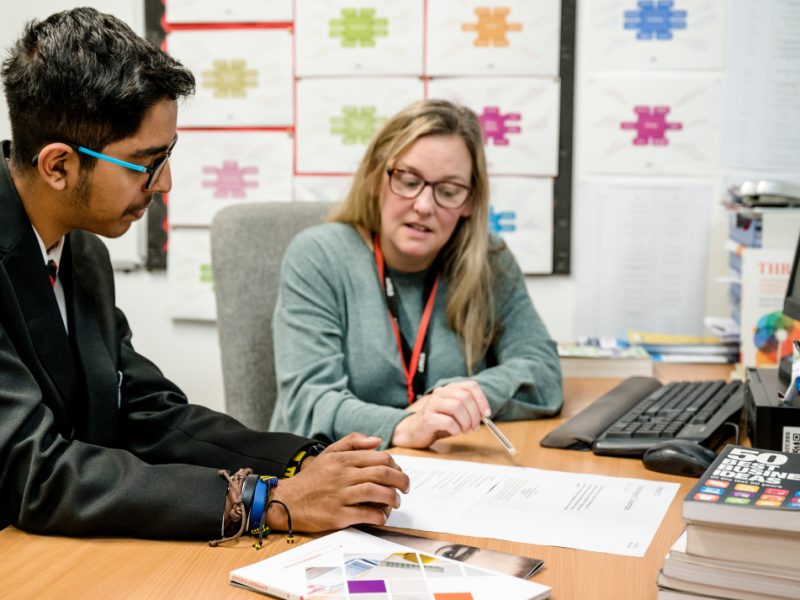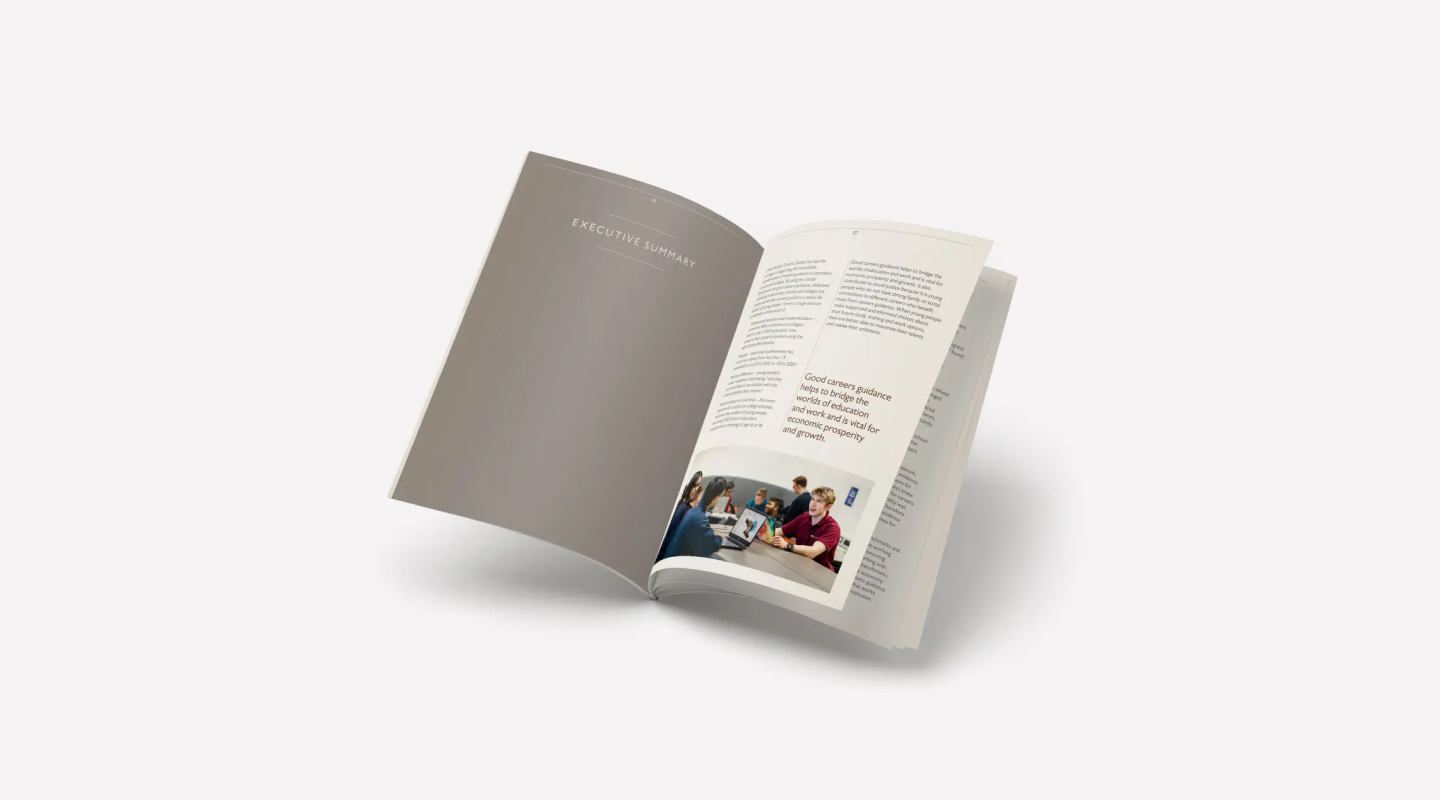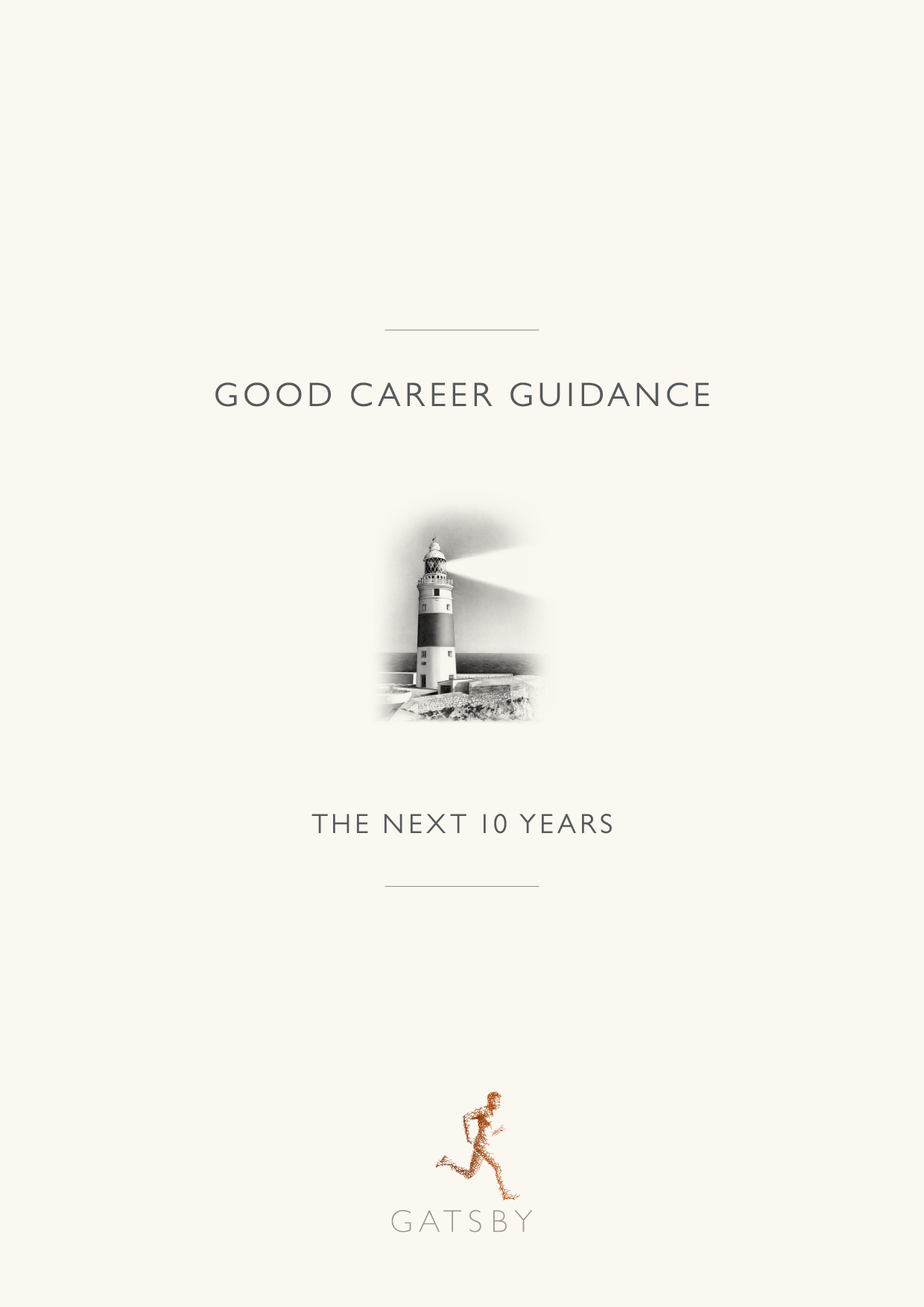A guide toGatsby Benchmark 8
Personal guidance
Every pupil should have opportunities for guidance meetings with a careers adviser, who could be internal (a member of school staff) or external, provided they are trained to an appropriate level. These meetings should be available for all pupils whenever significant study or career choices are being made. They should be expected for all pupils but should be scheduled to meet their individual needs. The careers leader should work closely with the careers adviser, SEND coordinator and other key staff to ensure personal guidance is effective and embedded in the careers programme.

Criteria for Schools
- Every pupil should have at least one personal guidance meeting, with a careers adviser by the age of 16, and a further meeting by the age of 18. Meetings should be scheduled in the careers programme to meet the needs of pupils.
- Information about personal guidance support, and how to access it, should be communicated to pupils and parents and carers, including through the school website.
Every learner should have opportunities for guidance meetings with a careers adviser, who could be internal (a member of provider staff) or external, provided they are trained to an appropriate level. These meetings should be available for all learners whenever significant study or career choices are being made. They should be expected for all learners but should be scheduled to meet individual needs. The careers leader should work closely with the careers adviser, SEND coordinator and other key staff to ensure personal guidance is effective and embedded in the careers programme.

Criteria for Colleges and ITPs
- Every learner should have at least one personal guidance meeting, with a careers adviser. Meetings should be scheduled in the careers programme to meet the needs of learners.
- Information about personal guidance support, and how to access it, should be communicated to learners, parents and carers, and other stakeholders, including through the provider website.
Trained careers advisers, whether a member of internal staff or externally commissioned, will be skilled in guidance techniques and have up-to-date knowledge of the full range of future pathways and labour market opportunities.
Good Career Guidance: The Next 10 Years
Case Study: Meadowhead School
At Meadowhead School in Sheffield, the careers leader is also a qualified careers adviser. In addition the school commissions external careers advisers who work closely with the careers leader as part of a careers team.
Young people have scheduled meetings at key decision points, but anyone can request meetings at other times if they need support. In Key Stage 4 and Key Stage 5, every pupil has at least one meeting with a careers adviser. In Key Stage 5 a triage system is in place, where group guidance is used to inform one-to-one follow-up meetings. Group guidance is also available to support pupils with tasks such as completing applications.
Personal guidance is embedded in the careers programme and the careers adviser attends events for specific year groups. These include Key Stage 3 assemblies and parents’ and carers’ events, and Key Stage 4 and 5 options talks, open evenings and application advice sessions.
The careers leader and careers advisers work closely with heads of year, pastoral managers, the SENDCO and the inclusion team to identify pupils who would benefit from tailored intervention. This includes pupils who lack motivation or a clear aspiration, disadvantaged or vulnerable pupils, those with SEND or those at risk of becoming NEET.
Case Study: Wigan & Leigh College
At Wigan & Leigh College all young people access personal guidance. A one-to-one meeting is part of the colleges’ student entitlement and is mandatory for those aged 16 to 18 and those up to the age of 24 with an education, health and care plan (EHCP). Delivery of personal guidance is tailored to the needs of young people. Guidance from a careers adviser is available to prospective students, during enrolment and ahead of key transition points. Records of careers discussions are available on a central system that supports students when making decisions. A letter detailing what the young person has indicated they want to do after their course and the next steps for achieving this is shared with parents and carers. The team of careers advisers, known as careers coaches at the college, are based on each campus and work closely with other key staff. They work with curriculum teams to plan and deliver suitable careers activities, often informed by labour market information (LMI), and provide training for wider staff. They also develop and deliver conferences, tutorials, group work and one-to-one sessions for students and their parents and carers.

Summary of research describing features of good personal guidance
Research from the last decade suggests personal guidance is most effective when it is:
- supported by senior leadership, including being appropriately resourced
- young person-centred and tailored to their individual needs
- conducted by qualified careers guidance professionals who adhere to ethical standards and use up-to-date and evidence-based approaches to ensure successful outcomes for young people
- integrated with other careers guidance activities and embedded in the institution’s comprehensive careers programme
- part of a sequence that includes preparation and follow up, that supports young people to prepare for personal guidance meetings and to implement the plans they formulate, including through follow-up meetings
- delivered in appropriate spaces, which are private, comfortable and an appropriate size
- fostering proactivity, using a range of approaches designed to encourage young people to proactively manage their own future and career, such as goal setting, agreeing clear next steps and boosting self-efficacy
- timely, including ensuring personal guidance meetings are an appropriate length and that they take place at the most appropriate point(s) in the young person’s learning.
Good Career Guidance: The Next 10 Years
Jump to Benchmark
Gatsby Benchmark 1
A stable careers programme
Gatsby Benchmark 2
Learning from career and labour market information
Gatsby Benchmark 3
Addressing the needs of each young person
Gatsby Benchmark 4
Linking curriculum learning to careers
Gatsby Benchmark 5
Encounters with employers and employees
Gatsby Benchmark 6
Experiences of workplaces
Gatsby Benchmark 7
Encounters with further and higher education
Gatsby Benchmark 8
Personal guidance

Publications
Browse our full collection of downloadable resources, including the reports themselves, associated appendixes and supporting literature.
